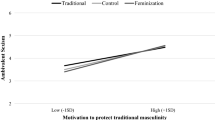Abstract
Drawing on my experiences with teaching Psychology of Women and writing three editions of a textbook across two decades starting in 1990, I reflect on the core feminist call to make the personal political. By tracing the chronology and interplay of my textbook writing with my teaching, research, and editing, I speculate about an apparent disconnection between my experiences and research with students (who embrace the feminist call to make a difference) and the textbook market to veer toward less women-centeredness and activism in the pursuit of gender studies. I make my case that the activist goal of making a difference continues to make a difference in individual women’s lives, in women’s relationships, and in a social justice agenda.
Similar content being viewed by others
References
American Psychological Association. (2010). Publication manual of the American Psychological Association (6th ed.). Washington: American Psychological Association.
American Psychological Association, A Joint Task Force of APA Divisions 17 and 35. (2007). Guidelines for Psychological Practice with Girls and Women. Retrieved from http://www.apa.org/about/division/girlsandwomen.pdf.
Beaton, A. M., & Tougas, F. (2001). Reactions to affirmative action: Group membership and social justice. Social Justice Research, 14, 61–78.
Brown, L. S. (1994). Subversive dialogues: Theory in feminist therapy. New York: Basic.
Campbell, W. K., Bonacci, A. M., Shelton, J., Exline, J. J., & Bushman, B. J. (2004). Psychological entitlement: Interpersonal consequences and validation of a self-report measure. Journal of Personality Assessment, 83, 29–45.
Fassinger, R. E. (1994). Development and testing of the Attitudes toward Feminism and the Women’s Movement (FWM) scale. Psychology of Women Quarterly, 18, 389–402.
Fausto-Sterling, A. (2000). Sexing the body: Gender politics and the construction of sexuality. New York: Basic.
Fischer, A. R., Tokar, D. M., Mergl, M. M., Good, G. E., Hill, M. S., & Blum, S. A. (2000). Assessing women’s feminist identity development: Studies of convergent, discriminant, and structural validity. Psychology of Women Quarterly, 24, 15–29.
Fiske, S. T., Cuddy, A. J. C., Glick, P., & Xu, J. (2002). A model of (often mixed) stereotype content: Competence and warmth respectively follow from perceived status and competition. Journal of Personality and Social Psychology, 82, 878–902.
Fredrickson, B. L., & Roberts, T. (1997). Objectification theory: Toward understanding women’s lived experiences and mental health risks. Psychology of Women Quarterly, 21, 173–206.
Gill, R. (2003). From sexual objectification to sexual subjectification: The resexualisation of women’s bodies in the media. Feminist Media Studies, 3, 100–106.
Gurin, P., & Townsend, A. (1986). Properties of gender identity and their implications for gender consciousness. British Journal of Social Psychology, 25, 139–148.
Henley, N. M., Meng, K., O’Brien, D., McCarthy, W. J., & Sockloskie, R. J. (1998). Developing a scale to measure the diversity of feminist attitudes. Psychology of Women Quarterly, 22, 317–348.
Heywood, L., & Drake, J. (1997). Third wave agenda: Being feminist, doing feminism. Minneapolis: University of Minnesota Press.
Johnson, A. G. (2006). Privilege, power, and difference (2nd ed.). New York: McGraw Hill.
Johnson, D. M., Worell, J., & Chandler, R. K. (2005). Assessing psychological health and empowerment in women: The Personal Progress Scale Revised. Women and Health, 41, 109–129.
LaFrance, M., Paluck, E. L., & Brescoll, V. (2004). Sex changes: A current perspective on the psychology of gender. In A. H. Eagly, A. E. Beall, & R. J. Sternberg (Eds.), The psychology of gender (2nd ed., pp. 328–344). New York: Guilford.
Liss, M., & Erchull, M. J. (2010). Everyone feels empowered: Understanding feminist self-labeling. Psychology of Women Quarterly, 34, 27–38.
Merskin, D. (2003). Fashioning foreplay: Fashion advertising and the pornographic imagination. Feminist Media Studies, 3, 106–109.
Moraga, C. (1981). The welder. In C. Moraga & G. Anzaldúa (Eds.), This bridge called my back: Writings by radical women of color (pp. 219–220). New York: Kitchen Table: Women of Color Press.
Stake, J. E. (2005). Psychology of Women Quarterly: Carrying on the traditions. Psychology of Women Quarterly, 29, 1–2.
Stewart, A. J., & McDermott, C. (2004). Gender in psychology. Annual Review of Psychology, 55, 519–544.
Taylor, V., & Whittier, N. (1997). The new feminist movement. In L. Richardson, V. Taylor, & N. Wittier (Eds.), Feminist frontiers IV (pp. 544–561). New York: McGraw Hill.
Whelehan, I. (2000). Overloaded: Popular culture and the future of feminism. London: The Women’s Press.
Wyche, K. F., & Rice, J. K. (1997). Feminist therapy: From dialogue to tenets. In J. Worell & N. G. Johnson (Eds.), Shaping the future of feminist psychology: Education, research, and practice (pp. 57–72). Washington: American Psychological Association.
Yoder, J. D. (1999). Women and gender: Transforming psychology. Upper Saddle River: Prentice Hall.
Yoder, J. D. (2003). Women and gender: Transforming psychology (2nd ed.). Upper Saddle River: Pearson Education.
Yoder, J. D. (2007). Women and gender: Making a difference (3rd ed.). Cornwall-on-Hudson: Sloan Publishing.
Yoder, J. D. (2010). Editorial: A feminist journal at the cutting edge of a psychology for women. Psychology of Women Quarterly, 34, 1–4.
Yoder, J. D., & Kahn, A. S. (2003). Making gender comparisons more meaningful: A call for more attention to social context. Psychology of Women Quarterly, 27, 281–290.
Yoder, J. D., Fischer, A. R., Kahn, A. S., & Groden, J. (2007). Changes in students’ explanations for gender differences after taking a Psychology of Women class: More constructionist and less essentialist. Psychology of Women Quarterly, 31, 415–425.
Yoder, J. D., Tobias, A., & Snell, A. (2009, August). The personal and political sides of undergraduate women’s feminist identification. Presented at the meeting of the American Psychological Association, Toronto.
Zirin, D., & Wolf, S. (2009, Aug. 21). Caster Semenya: The idiocy of sex testing. The Nation. Retrieved from http://www.thenation.com/doc/20090831/zirin_wolf
Zucker, A. N. (2004). Disavowing social identities: What it means when women say, “I’m not a feminist, but...”. Psychology of Women Quarterly, 28, 423–435.
Author information
Authors and Affiliations
Corresponding author
Rights and permissions
About this article
Cite this article
Yoder, J.D. Does “Making a Difference” Still Make a Difference?: A Textbook Author’s Reflections. Sex Roles 62, 173–178 (2010). https://doi.org/10.1007/s11199-009-9732-3
Published:
Issue Date:
DOI: https://doi.org/10.1007/s11199-009-9732-3




